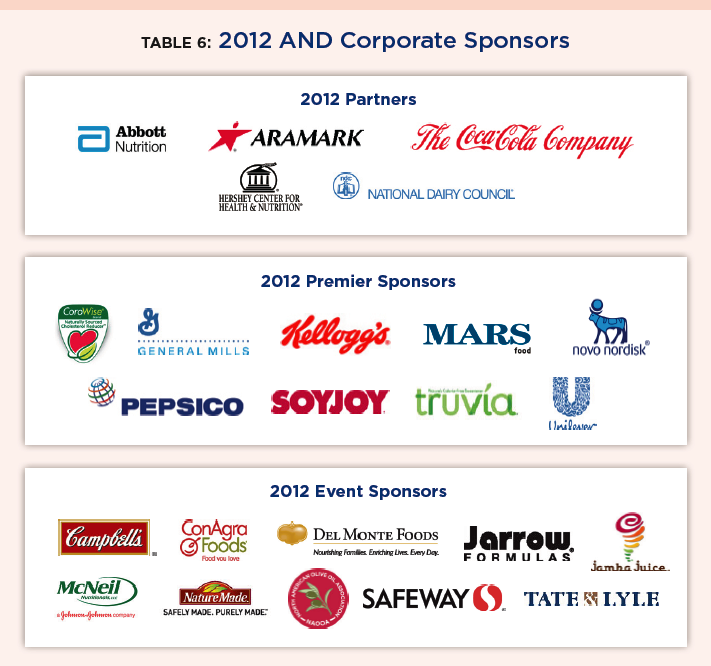This session is on Practicing Food Studies. It will be at 5;00 p.m. Details to come.
New study: Big Food’s ties to Registered Dietitians
Michele Simon, president of Eat, Drink, Politics, an industry watchdog consulting group, has just published an exposé of the close financial relationships between food and beverage companies and the Academy of Nutrition and Dietetics (AND, formerly the American Dietetic Association).
Her hard-hitting report, And Now a Word from Our Sponsors: Are America’s Nutrition Professionals in the Pocket of Big Food? provides ample evidence that partnerships and alliances with Big Food make it impossible for AND members to convey clear and accurate messages about nutrition and health.
When she talks about nutrition professionals, she doesn’t mean me. I have a PhD (in molecular biology, although long lapsed) and a master’s in Public Health Nutrition. She means AND members. AND represents more than 70,000 individuals who mostly hold credentials as Registered Dietitians (RDs).
To qualify, they had to complete a bachelor’s degree that included a specified set of courses and a 6-month clinical internship. I once tried to get credentialed as an RD after I completed a qualifying internship but I had never had a practical course in food service management. That lack was a deal breaker.
Never mind. Here’s what Simon’s report is about:
And here are a small selection of her observations and conclusions:
- AND collected $1.85 million in sponsorship funds in 2011, a relatively small percentage of its $34 million income.
- Companies such as Coca-Cola, Kraft, Nestlé, and PepsiCo offer approved continuing education courses to AND members.
- Two of the messages conveyed by one of Coca-Cola’s courses: sugar is not harmful to children, and federal nutrition standards for school meals are too restrictive.
- More than 20% of speakers at AND’s annual meeting have financial ties to Big Food companies, although most were not disclosed.
- A survey found 80% of members to believe that sponsorship implies an AND endorsement of the sponsor’s products.
- A majority of AND members believe that three current sponsors are unacceptable: Coca-Cola, Mars, and PepsiCo.
If you want to see how sponsorship plays out in practice, take a look at her photographs of the exhibit hall at the 2012 AND annual meeting. She also provides photos taken elsewhere at the meeting. And here’s the New York Times’ take on it.
As a trade association for Registered Dietitians, AND—as I discussed in Food Politics—has as its primary goal to position RDs as the leading source of nutrition information for patients, clients, and the public.
As you might imagine, I’ve always had a bit of trouble with that goal.
For one thing, nutritionists with master’s and doctoral degrees are likely to know more than RDs about nutrition science and to think more critically about it.
For another, that self-interested goal creates an image problem. RDs might be accepted as more credible sources if their primary goal was to improve the nutritional health of the American people.
Their advice also would be more credible if AND were not so heavily linked to food and beverage corporations, especially those whose products contribute to poor health.
Let’s hope this new report gets AND members talking about how to change some current AND policies.


